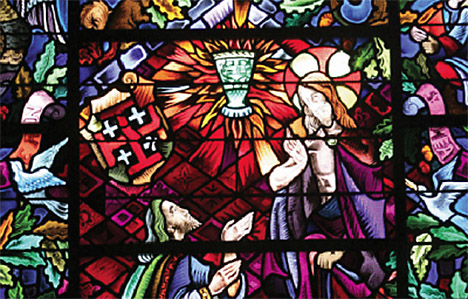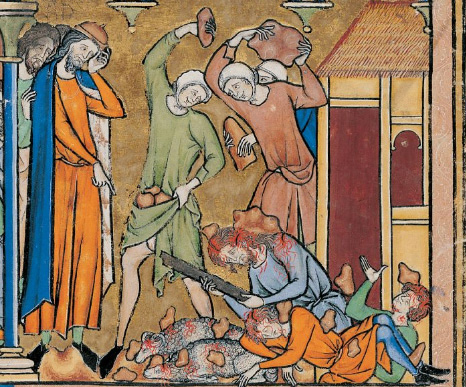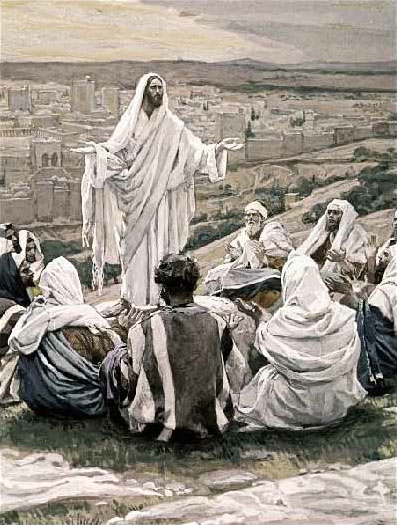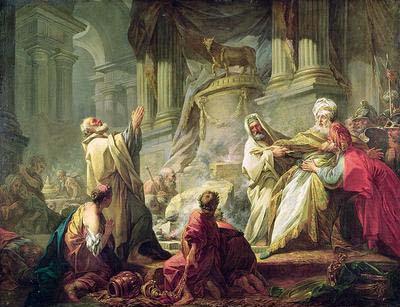Jul
8
2015

“By the imperative, time is formed into a cup, still empty but formed for the special purpose of being filled with the content demanded by the order.”
The Imperative Comes First
Essay by John Barach
As many people have pointed out, in Christian ethics, the indicative precedes the imperative. First God says, “I am Yahweh your God, who brought you out of the land of Egypt, out of the house of bondage,” and then he gives the Ten Words (“You shall have no other gods before me…”). First Paul tells us what Christ has done and who we are in Christ, and then he summons us to act accordingly. First comes the good news of what God has done for us and then comes the summons to respond in faith and love and new obedience.
Continue reading
Comments Off | tags: Covenant Theology, Eugen Rosenstock-Huessy, John Barach, Ten Commandments | posted in Biblical Theology, Creation, Quotes
Jul
21
2014

For seizing the devoted plunder of Jericho, Achan was stoned to death and burned with fire, along with his children, livestock, and all his possessions. This judgment appears to contradict Deuteronomy 24:16, which forbids the punishment of children for the sins of their fathers.
It seems that the solution is architectural. Here’s an excerpt from the forthcoming Sweet Counsel:
Continue reading
Comments Off | tags: Achan, Covenant curse, Covenant Theology, Joshua, Tabernacle, Ten Commandments | posted in Bible Matrix, Biblical Theology
Feb
18
2014

This post is from Chris Wooldridge’s blog. His take on the structure of the Lord’s prayer is a little different to mine (I have the evil one at the center) but I find it very attractive and interesting. He writes:
Continue reading
7 comments | tags: Chris Wooldridge, Literary Structure, Matthew, Ten Commandments | posted in Biblical Theology
Oct
22
2013

When Moses is given the Ten Commandments they are written on two tablets:
And he declared to you his covenant, which he commanded you to perform, that is, the Ten Commandments, and he wrote them on two tablets of stone. (Deuteronomy 4:13)
Why are the Ten Commandments written on two tablets? Was one tablet not big enough for God’s handwriting? Or did God give Moses two copies of the Law, one tablet being a duplicate of the other?
Continue reading
Comments Off | tags: Aaron, Covenant Theology, Exodus, Literary Structure, Meredith Kline, Moses, Ray Sutton, Ten Commandments | posted in Bible Matrix, Biblical Theology, Q&A
Aug
31
2013

“Once prosperous (gold), we forgot God and dismantled marriage (girls) and then relied upon military power rather than God’s protection to maintain peace with our enemies (guns).”
In Deuteronomy 17:14-20, Moses gave Israel three laws for her future kings. As moderns who wrongly assume the Bible is merely “propositional truth,” we not only fail to see these three laws as a continuum, and thus fail to identify them in Bible history, we also fail to interpret contemporary history in their brilliant “triune” light.
Continue reading
Comments Off | tags: Covenant Theology, David, Deuteronomy, Egypt, Herod, Literary Structure, Mission, Solomon, Tabernacle, Ten Commandments | posted in Bible Matrix, Biblical Theology
Jul
9
2013

And he was teaching them and saying to them, “Is it not written, ‘My house shall be called a house of prayer for all the nations’? But you have made it a den of robbers.” (Mark 11:17)
The same word is used of the men crucified alongside Jesus in Mark 15:27.
And with him they crucified two robbers, one on his right and one on his left.
Is this merely coincidental, or is there something deeper going on? Is there a link between the “white collar” Temple crimes and the “blue collar” criminals?
Continue reading
3 comments | tags: Atonement, Crucifixion, Genesis, Mark, Temple, Ten Commandments | posted in Bible Matrix, Biblical Theology
May
28
2013
or Back To Egypt in Ships

“That which they sought to save them from the condemnation of the Law of Moses has also innoculated them against the grace and Spirit of Jesus Christ.”
Pope Francis, in a recent homily, has written,
[This post has been refined and included in Sweet Counsel: Essays to Brighten the Eyes.]
Continue reading
3 comments | tags: Covenant Theology, Luke, Moses, Roman Catholicism, Ten Commandments | posted in Apologetics, Bible Matrix, Biblical Theology, Christian Life
Oct
21
2012
“The Sabbatarian vision is too small. This is why Paul chides the Galatians for observing ‘days and months and seasons and years.’ The Sabbath, along with the Torah administration as a whole, belonged to the stoicheia, the “elements of the world,” the things that constituted the first creation.”
From Tim Gallant’s blog:
Continue reading
Comments Off | tags: Elijah, Galatians, James Jordan, John the Baptist, Matthew, Pharisees, Revelation, Ten Commandments, Tim Gallant | posted in Biblical Theology, Quotes, The Last Days
Jun
19
2012
or The New Commandment
1 John 5: 1-12 | Sermon Notes | 17 June 2012

Introduction
Jewish Christians were first opposed by unbelieving Jews, then by Jews who said they believed. Members of this latter group are called “Judaizers,” and they were the false teachers whom the apostles condemn in their letters.
Not only did these men pervert the gospel by including adherence to the Law of Moses, they also failed to keep the commandments of Jesus. This was Pharisaism dressed up in Christianity, the old leaven carried into the new age. The Pharisees loved to control people, while they failed to control themselves. This is the context of John’s letters to Jewish Christians: despite their profession, these men would be exposed by their lack of of certain things in their character.
Continue reading
Comments Off | tags: Baptism, Circumcision, Covenant curse, Covenant Theology, John, Literary Structure, Mission, Pharisees, Sermons, Ten Commandments | posted in Bible Matrix, Biblical Theology, The Last Days
May
25
2012
 “1-2 Kings gives us no such comfort: Christ has been divided in our divisions.”
“1-2 Kings gives us no such comfort: Christ has been divided in our divisions.”
Peter Leithart’s blog is included on the blogroll here, and most readers here read PJL anyway, but his recent posts on Church unity are worthy of flags being flown everywhere possible.
Continue reading
Comments Off | tags: Compromise, Jeroboam, Kings, Peter Leithart, Roman Catholicism, Ten Commandments | posted in Biblical Theology, Quotes


































